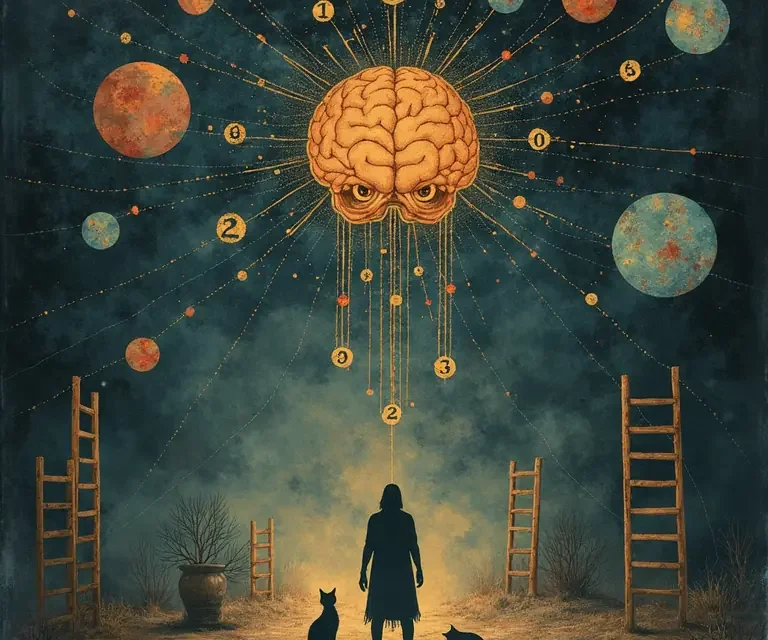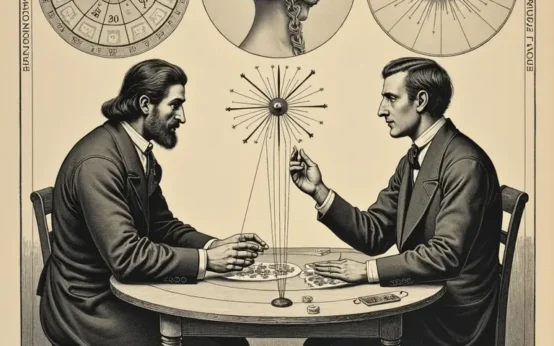Superstitions. We all have them, whether we readily admit it or not. Averting your eyes from a black cat crossing your path, knocking on wood for good luck, avoiding walking under ladders – these behaviors seem irrational, relics of a bygone era. But beneath the surface of these seemingly illogical beliefs lies a fascinating story, one rooted in our evolutionary history, cognitive biases, and the very human need to find patterns and exert control over an unpredictable world. This article will delve into the surprisingly logical origins of superstition, exploring how these beliefs arose, why they persist, and what they reveal about the human mind.
The Brain’s Pattern-Seeking Machine
At the heart of superstition lies our brain’s incredible ability – and sometimes, its tendency – to detect patterns. Humans are pattern-seeking animals. From infancy, we are wired to identify regularities in our environment. This ability was crucial for survival. Recognizing patterns allowed our ancestors to predict the movements of predators, the changing of seasons, and the availability of resources. However, this powerful cognitive tool isn’t always accurate. We often perceive patterns even where none exist, a phenomenon known as apophenia.
Apophenia is the experience of seeing meaningful connections in random or meaningless data. Think of seeing shapes in clouds or faces in inanimate objects. This tendency extends to events, too. If something good happens after a particular action – say, wearing a lucky shirt – our brains are prone to associating the two, even if the connection is purely coincidental. This is the foundation of many superstitious beliefs. We create a mental shortcut, believing that performing the action *caused* the positive outcome.
Control and the Illusion of Influence
Superstition isn’t just about pattern recognition; it’s also deeply connected to our need for control. Life is inherently uncertain. Natural disasters, illness, accidents – these events can feel random and terrifying. In situations where we feel powerless, superstition offers a sense of agency. Performing a ritual, carrying a lucky charm, or avoiding certain actions can create the *illusion* of control, reducing anxiety and providing a psychological buffer against the unpredictable nature of life.
Consider the example of baseball players and their pre-game rituals. Many players have elaborate routines – specific batting stances, avoiding certain lines on the field, or wearing the same socks for every game. These rituals aren’t necessarily based on any rational belief that they will improve performance. Instead, they provide a sense of control and predictability in a high-pressure environment. The ritual itself becomes a way to manage anxiety and focus attention.
The Evolutionary Roots of Magical Thinking
Some psychologists argue that the roots of superstition extend even deeper, to our evolutionary past. Early humans often operated under a worldview that wasn’t strictly based on cause and effect. Before the development of scientific understanding, attributing agency to natural forces – believing that spirits inhabited trees, rivers, and animals – was common. This “magical thinking” wasn’t necessarily irrational; it provided a framework for understanding and interacting with the world.
For instance, rituals surrounding hunting and gathering were often imbued with magical significance. Believing that performing a certain dance or offering a sacrifice would ensure a successful hunt could boost morale and encourage cooperation, ultimately increasing the chances of success. While these practices weren’t based on scientific principles, they served an important social and psychological function. The belief in a supernatural influence could motivate behavior and strengthen group cohesion.
Lucky Numbers: A Cross-Cultural Phenomenon
The belief in lucky and unlucky numbers is a widespread phenomenon, varying significantly across cultures. In Western cultures, 7 is often considered lucky, while 13 is associated with bad fortune. The origin of these beliefs is complex and often steeped in history and mythology.
The association of 7 with luck dates back to ancient times. The Babylonians considered 7 a sacred number, linked to the seven visible planets. In Christianity, God created the world in six days and rested on the seventh. The number 7 also appears frequently in mythology and folklore, reinforcing its positive connotations.
The fear of 13, known as triskaidekaphobia, has less clear origins. One theory suggests it stems from the Last Supper, where Judas Iscariot was the 13th guest. Another possibility is that 12 is often seen as a “complete” number (12 months, 12 zodiac signs), making 13 feel disruptive and unbalanced. The association of Friday the 13th with bad luck is a relatively recent phenomenon, gaining prominence in the 20th century.
In contrast, in many Asian cultures, 8 is considered lucky. This is because the pronunciation of the number 8 in Cantonese sounds similar to the word for prosperity or wealth. This association has made 8 a highly sought-after number for phone numbers, license plates, and even building addresses. Similarly, the number 4 is often avoided in East Asian cultures because its pronunciation is similar to the word for death.
Animal Superstitions: Black Cats, Owls, and More
Animals have long been associated with superstition, often serving as symbols of good or bad luck. Black cats, perhaps the most famous example, have a particularly complex history.
In many Western cultures, black cats are considered unlucky, linked to witchcraft and the occult. During the Middle Ages, cats, particularly black ones, were often associated with witches and believed to be their familiars (spiritual companions). This association led to the persecution of cats, and the belief that they brought bad luck persisted.
However, in some cultures, black cats are seen as *lucky*. In Scotland, a black cat appearing on your doorstep is considered a sign of prosperity. In Japan, black cats are believed to bring good luck, especially to single women. This demonstrates how cultural context plays a crucial role in shaping superstitious beliefs.

Other animals also feature prominently in superstitions. Owls are often associated with wisdom, but also with death and misfortune. Spiders are sometimes seen as lucky, while others fear them. Snakes can symbolize both healing and danger. These associations often stem from the animal’s behavior, appearance, or role in mythology and folklore.
The Power of Rituals and Compulsions
Superstitions often manifest as rituals – specific actions performed in a particular way to achieve a desired outcome. These rituals can range from simple actions like knocking on wood to more elaborate ceremonies. While most superstitious rituals are harmless, they can sometimes escalate into compulsive behaviors, particularly in individuals with obsessive-compulsive disorder (OCD).
OCD is characterized by intrusive thoughts (obsessions) and repetitive behaviors (compulsions) aimed at reducing anxiety. While not all superstitions are indicative of OCD, the underlying mechanisms – the need for control and the belief in a connection between actions and outcomes – are similar. Individuals with OCD may develop elaborate rituals based on irrational fears, believing that failing to perform the ritual will lead to catastrophic consequences.
Superstition and Cognitive Biases
Several cognitive biases contribute to the persistence of superstitious beliefs. Confirmation bias, for example, leads us to pay attention to information that confirms our existing beliefs while ignoring evidence that contradicts them. If someone believes that wearing a lucky shirt brings them good luck, they are more likely to remember the times they won while wearing the shirt and forget the times they lost.
Another relevant bias is the illusion of control, which we’ve already discussed. This bias leads us to overestimate our ability to influence events, even when they are clearly random. The gambler’s fallacy – the belief that after a series of losses, a win is “due” – is another example of a cognitive bias that fuels superstitious behavior.
The Cultural Transmission of Superstition
Superstitions aren’t simply individual quirks; they are often transmitted through culture. Stories, myths, and traditions play a vital role in perpetuating these beliefs across generations. Parents pass down superstitions to their children, who then pass them down to their children, and so on.
The media also contributes to the spread of superstition. Movies, books, and television often depict superstitious beliefs, reinforcing their cultural relevance. Even seemingly innocuous portrayals of superstitions can contribute to their persistence.
Superstition in the Modern World
Despite advancements in science and technology, superstition remains remarkably prevalent in the modern world. Why is this the case? As we’ve seen, superstition fulfills several important psychological needs – providing a sense of control, reducing anxiety, and offering a framework for understanding the unpredictable.
Furthermore, in a world that often feels complex and overwhelming, superstition can offer a sense of comfort and familiarity. Believing in a lucky charm or performing a ritual can provide a small measure of agency in a world that often feels beyond our control.
The Benefits of Belief (Sometimes)
While often dismissed as irrational, superstitious beliefs can sometimes have positive effects. Placebos, for example, demonstrate the power of belief in influencing physical and mental health. If someone believes that a lucky charm will protect them, it can boost their confidence and reduce anxiety, potentially leading to improved performance.
Furthermore, superstitious rituals can foster a sense of community and shared identity. Participating in a traditional ritual can strengthen social bonds and provide a sense of belonging.
Conclusion: Understanding the Logic Behind the Illogical
Superstition, far from being a sign of irrationality, is a testament to the human mind’s remarkable ability to find patterns, seek control, and make sense of the world. It’s a product of our evolutionary history, cognitive biases, and cultural transmission. While some superstitions may be harmless quirks, others can be debilitating. Understanding the underlying psychological mechanisms that drive superstitious beliefs can help us to better understand ourselves and the world around us. By acknowledging the logic behind the illogical, we can appreciate the enduring power of superstition in the human experience.
Want to learn more about how ancient cultures understood time? Check out the surprising role of bees in ancient timekeeping. Interested in how scent affects memory? Explore the unexpected science of smell. And to understand how humans communicate non-verbally, read about the global tapestry of gestures. For a look at the evolution of leisure, see the curious evolution of board games. Finally, learn about the fundamental building blocks of civilization with the art of knots.


 The Unexpectedly Scientific Roots of Fortune Telling Methods
The Unexpectedly Scientific Roots of Fortune Telling Methods